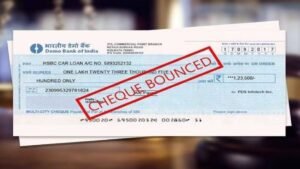Cheque Bounce in India: Meaning, Causes, Legal Process, and Remedies
In India, checks have long been a popular way to make payments, particularly for big purchases. But even with their extensive use, check bounce or dishonour is still a frequent legal problem that both individuals and corporations must deal with.
According to the Negotiable Instruments Act of 1881, a bounced check is not just a financial annoyance but also a crime in India. The notion of check bounce in India, along with its causes, legal remedies, and the entire legal process for handling such matters, are all explained in this blog.

What is Cheque Bounce?
A check bounce happens when a bank returns a check that has been underpaid or dishonoured for a number of reasons, including a closed account, insufficient funds, or a mismatched signature. It is considered a serious offense, particularly if the check was written to satisfy a debt or responsibility that was enforceable by law.
Common Reasons for Cheque Bounce in India
-
Insufficient Funds: There is not enough money in the issuer’s bank account.
-
Signature Mismatch: The drawer’s signature is not the same as what the bank has on file.
-
Wrong Date on Cheque: Checks that are stale or postdated may not be honored.
-
Overwriting on Cheque: Overwriting or tampering could result in rejection.
-
Account Closed: if the account of the drawer has been closed.
-
Stop Payment: The bank was told to halt the payment by the drawer.
-
Mismatch in Amount in Words and Figures: Disparities result in dishonor.
Legal Provisions Related to Cheque Bounce in India
Section 138 of the Negotiable Instruments Act, 1881
Check bounce situations are particularly covered by Section 138, which makes it a crime.
Key Conditions for Legal Action:
-
The check must have been written to settle a debt or obligation that was enforceable by law.
-
Within three months of the date of issuance, the check must be delivered to the bank.
-
After obtaining the “cheque return memo” from the bank, the payee has 30 days to provide the drawer with a legal notification.
-
The payee may file a criminal complaint in court if the drawer does not make the payment within 15 days after getting the notice.
Penalty for Cheque Bounce in India
If found guilty under Section 138:
-
Imprisonment for a maximum of two years or
-
A fine equal to twice the amount on the check, or
-
Both a fine and a jail sentence.
Cheque Bounce Legal Process in India
-
Cheque Dishonour: A “cheque return memo” with the reason for dishonor is issued by the bank.
-
Sending Legal Notice: Within 30 days, the payee issues a demand notice, requesting payment within 15 days.
-
Filing Complaint: The payee has 30 days from the end of the notification period to file a criminal complaint with the magistrate if the drawer fails to pay.
-
Court Proceedings: The accused will be called, the evidence will be reviewed, and the trial will be held.
-
Judgment: The court may sentence the offender to jail time, a fine, or both if proven guilty.
Documents Required for Filing Cheque Bounce Case
-
Original check that was returned unpaid
-
Memorandum of check return from the bank
-
A copy of the mail receipt and legal notice
-
Evidence of notice delivery
-
Any contract or evidence of obligation or liability
Civil Remedy for Cheque Bounce
The payee may pursue a civil recovery suit under Order XXXVII of the Code of Civil Procedure (CPC) in addition to pursuing criminal action in order to recoup the check amount plus interest.
How to Avoid Cheque Bounce Cases?
-
Make sure there are enough funds before writing a check.
-
Steer clear of postdated checks unless absolutely required.
-
Double-check every information, including the amount, date, and signature.
-
Checks should not be altered or overwritten.
-
Maintain accurate records of every check transaction.
Conclusion
In India, check bounce can result in serious legal and financial issues. Payees and drawers need to understand their rights and obligations. When a check bounces, prompt legal action is essential, and speaking with a legal professional can facilitate a speedy conclusion.
